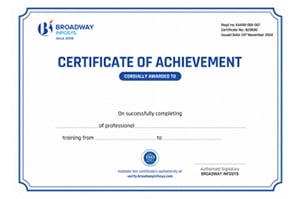Students who got hired learning this course
Hear from graduates who have completed our courses.
DevOps training in Nepal by Broadway Infosys is made to give students the abilities and information they need to become competent DevOps experts.
DevOps course comprises five modules, each focusing on a different area.
The first module, Introduction to DevOps, provides an overview of DevOps practices, principles, CI/CD, and current practices.
Module two covers DevOps Prerequisites: Linux Fundamentals. In this module, learners will learn about Linux operating systems, Linux distributions, operating system concepts, the Linux shell, package management, scheduling scripts and tasks, remote access, archiving, and monitoring application logs.
Module three covers DevOps Prerequisites: Networking, topics such as Understanding Networks and IP, Ports, Firewalls, Introduction to Networking Protocols, Virtual Networking, Network Commands, and more.
Module four covers DevOps Prerequisites: Basic Cryptography, and learners will be introduced to encryption, hashing, salting, public key cryptography, SSL certificates, passwordless SSH, and getting a free SSL certificate with Let's Encrypt.
Finally, Module Five covers DevOps Prerequisites: SCM. In this module, learners will be introduced to source control management with Git and will learn about Git operations, Gitignore, Git branches, and pull requests, among other topics.
Broadway Infosys' DevOps training covers all the essential aspects of DevOps, from basic Linux to advanced Git operations, ensuring learners are well-versed in every aspect of DevOps.
Hear from graduates who have completed our courses.

Add this credential to your LinkedIn profile, resume, or CV to stand out to recruiters.
